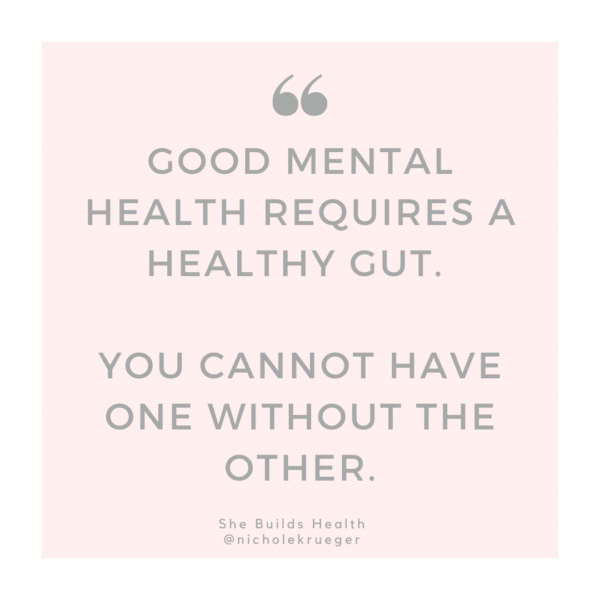Good mental health requires a healthy gut
By Nichole Krueger | February 18, 2020

1 out of 5 people suffer from anxiety, depression, or both.
Women are almost twice as likely to suffer from a mood disorder than men.
And for a large percentage of these people, conventional treatments aren’t helping.
You switch meds, try new therapists and therapies, and eventually wonder if you’re just destined to feel this way forever. I know, because this was me.
Most people think that if they have anxiety, depression, overwhelm, inability to focus, etc., it’s an issue with their brain. Sometimes it is. But MUCH of the time the problem begins in the gut. As a matter of fact, good mental health requires a healthy gut.
And the sneaky thing is, you may not even FEEL anything off balance in your gut.
Digestive issues can contribute to how you feel as far as your mood goes. It can cause depression, anxiety, insomnia, brain fog, etc. As a matter of fact, many of the issues that are labeled as “mental health” issues are resolved when we treat the gut.
It could be triggered by a response to certain foods that you’re eating. Or you could have imbalances or overgrowths in “bad” bugs in your gut. Your gut lining could be leaky. Or it could be all of the above.
Our gut and our brain work so closely together that if one is unhealthy, it will certainly affect the other. This is because there is a very powerful gut-brain connection.
How, exactly, are the gut and brain connected?
The connection between the gut and the brain is called the gut-brain axis. The gut and the brain are intimately connected in the following ways:
The Vagus Nerve
The vagus nerve is one of the biggest nerves connecting the gut to the brain. It sends signals in both directions – from gut to brain, and from brain to gut (1). Our gut actually contains millions of neurons that connect to our brain through the nerves in our nervous system – one of the reasons out gut is called our second brain.
The Immune System
Your gut and brain are connected through your immune system. Have you heard that 70% of your immune system is housed in your gut? When your gut becomes inflamed and leaky, bacteria and their toxins are able to cross over into the immune system and into the body. Lipopolysaccharide (LPS) is one of the toxins that can wreak havoc on the brain. It is created by certain bacteria and has been associated with brain disorders including depression schizophrenia, and dementia (2).
Neurotransmitters
We often think that brain chemicals are made in the brain, but that’s not the whole story. Gut bacteria produce a large percentage of our neurotransmitters (the chemical messengers used to allow nerve cells to talk to one another). According to the American Psychological Association, “gut bacteria manufacture about 95 percent of the body’s supply of serotonin, which influences both mood and GI activity.”
Upwards of 50% of dopamine is also produced in the gut by gut bacteria. Dopamine is important because it plays a role in how we feel pleasure. It helps us to find interest in life, focus, and achieve our accomplishments.
If you want a healthy brain, we start by looking at the gut.

Want to take a peek inside your gut??
When I work with my clients, one of the things that we do is run a stool test. This allows us to take a peek inside your gut to see what kind of imbalances you may have. Parasites, yeast, bacteria – some of these are a normal part of our digestive system, but many times we have bugs that don’t belong (or too much of the good ones!) which can cause a whole host of symptoms including joint pain, brain fog, anxiety, depression, bloating, cramping, diarrhea, constipation…and the list goes on.
Do you want to see if your symptoms could be caused by imbalances in your GI tract? Click his link to book your free (no strings attached) consult.


